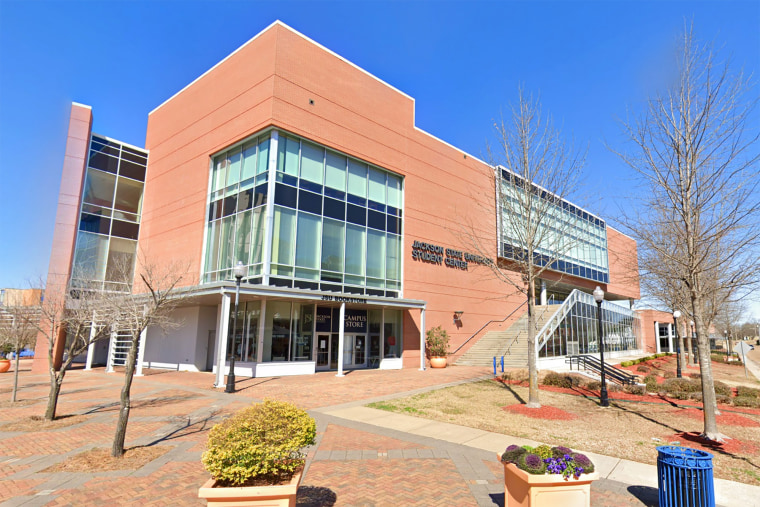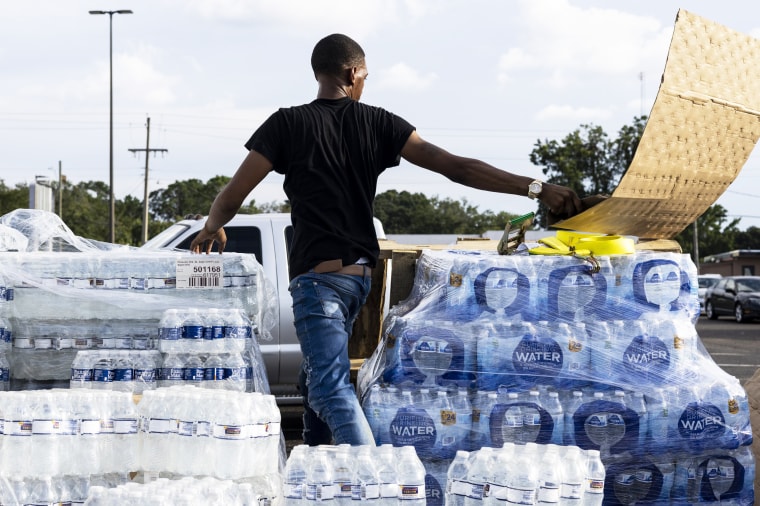Desmond Washington was hospitalized with a severe rash on his back after showering last week in his dorm in Mississippi’s capital city of Jackson. The ongoing water crisis there has not only left residents without a reliable water supply, it has forced students like Washington out of the classroom.
A doctor told Washington, a Jackson State University sophomore, that the water had exposed him to bacteria. He left the hospital shortly after receiving an IV drip with antibiotics.
“When I came back from the hospital, they said we couldn’t use the water and took us out of class for a week,” Washington said. “So that’s now limiting our class time and learning, and one of the things I was excited about this year was that we’d be 100% back and not doing virtual learning. But now it’s been virtual last week and that’s how we’ll attend this upcoming week.”
The water crisis that prompted the historically Black public university to delay its student move-in date and return to virtual learning has also left K-12 students, teachers and families scrambling.
School leaders, meanwhile, are fielding questions from frustrated students and angry parents about the problems while they wait for answers from city and state officials — the only ones who can really speak to when Jackson will get reliable water service back after the failure of its water treatment pumps.

In the meantime, students in Jackson Public Schools, a predominantly Black K-12 district, and institutions like Jackson State University, are attending virtual classes, drinking bottled or boiled water and hoping they’ll be able to return to the classroom in the next week.
Derykah Watts, a junior at Jackson State, said she and her roommates now keep bottled water in the bathroom and the kitchen because their taps have become effectively useless.
“As human beings and Americans, we should have access to clean and safe water, and it just feels almost impossible for us at this point,” she said.
George Stewart, a middle school teacher in Jackson Public Schools and president of the Jackson Association of Educators, said he and other district educators are deeply concerned this could lead to a major step back for their students who just made gains in state testing this past year.
He noted it’s a particular challenge for families who must now figure out child care with students back at home, which can lead to some students leaving the district as they go to stay with friends or relatives.
“It is disheartening and discouraging because we know our students are making gains and improving,” said Stewart, who is helping lead a letter-writing campaign to the state Legislature over the water issue. “So when this happens, some of our students are going to be displaced, and then this will create a situation where students fall behind academically. So it’s really a tough time right now.”
‘A long-term fix’
One of the biggest frustrations for school leadership and members of the academic community is that the water problem isn’t new. The persistent issue has forced students from classrooms in the past, and it remains a threat to their ability to maintain a consistent school year.
“This has been a break that has been waiting to happen and it’s a byproduct of an aging infrastructure and water system that’s badly needed repairs and requires major, major dollars to fix,” said Jackson State University President Thomas Hudson. “That’s been known for a while and we really need to find a long-term fix here.”
Jackson State leaders are so frustrated with the continuing water issue, which includes water line breaks and regular boil water advisory notices, that they have pushed in recent years to obtain their own water system separate from the city’s. The state Legislature has so far failed to do much with the request.
Hudson has received some good news. After putting in a request to the state government for American Rescue Plan funding, Jackson State received approval to conduct a study that would help create a “Potable Water Contingency Plan.”
In its request, the university also asked for a water and sewer line infrastructure assessment, the repair and enlargement of its storm water lines and a new water filtration system. The request also remarked on the city’s aged and fragile infrastructure that contains lines made of toxic metals.
The hope is that the water contingency plan would help the university identify both long- and short-term solutions. Without alternative ways of tackling the water issues, the university warned it would have to be prepared to evacuate 2,000 students at a moment’s notice, lose its fire protection system and risk damage to the university’s water pumps.
The request said the projects “must be completed regardless of funding” by the American Rescue Plan.

A Mississippi Department of Finance Administration document obtained by NBC News shows the university is scheduled to receive $2.25 million in American Rescue Plan dollars in the next fiscal year — less than half of the $5 million Jackson State requested for the water projects.
While they will receive funds this month to pursue the study, which the Department of Finance Administration will oversee, Hudson emphasized that there is a long road ahead.
“We’re thankful and we’re optimistic that this will lead to a long term fix,” he said, “but there is a timeline to this. It’s very possible we will have another situation before this comes to fruition.”
What to know about the water crisis in Jackson
In the meantime, students and teachers have their eyes on political leaders to ensure that Jackson’s water system is repaired and upgraded. Some are also organizing water drives for their own communities to channel their frustrations toward something productive.
While buying pallets of water at a Home Depot in Jackson, Maisie Brown, a political science senior at Jackson State, said she and other students have collected around $5,000 to buy water and deliver it to their classmates and city residents. She said they’ve noticed many students, however, decided to leave the campus when the prospect of using portable showers and toilets rolled in.
Brown and some of the remaining students’ efforts are now focused on dealing with the water issue locally. But Brown said they intend to make their anger heard by state lawmakers once the next legislative session arrives — particularly after legislators did not let a bill that would have funded a change to Jackson State’s water system make its way out of committee.
“We can’t lose,” she said. “Even though the system has let us down, we have to keep going.”
Source: | This article originally belongs to Nbcnews.com










